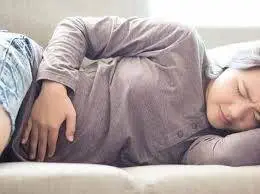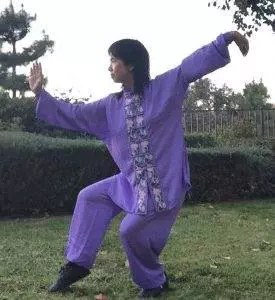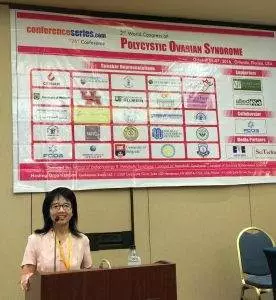by Xiaomei Cai, L.Ac., Ph.D.

PCOS (polycystic ovarian syndrome) is a complex condition that affects at least 10% of women during their reproductive years. In many cases, PCOS begins when a woman is still in her teens, and, if left unaddressed, can continue all the way through her 40s. The major complaint is irregular cycles; sometimes women with PCOS only have a period every few months, or even only a few in a year. PCOS is considered to be both a disorder of both the reproductive and endocrine systems. As such, medical treatment typically involves using hormone therapy to restore the menstrual cycle. Acupuncture and TCM offer an alternative to the use of synthetic hormones for PCOS by helping to balance hormones, restore natural ovulation, and boost fertility.
As a syndrome, PCOS is not a fully understood disease, but a collection of symptoms that often appear together. What is clear is that PCOS is one of the primary causes of infertility among women. This is due to the fact that most women with PCOS ovulate rarely, if at all. Women with PCOS tend to have hyperandrogenemia, which means higher than normal levels of androgens, especially testosterone. Insulin resistance is also common in women with PCOS, increasing risks of diabetes, glucose intolerance, and obesity.
Women frequently do not realize they have this condition. Even when women do seek medical advice for missed periods and occasionally heavy periods, PCOS is largely left undiagnosed. Rather, young women are usually given birth control pills, which seem to alleviate the symptoms by bringing on regular menstrual cycles. This means that many women do not discover that they have PCOS until they have stopped taking contraceptive medication and their periods stop.
Top 10 Symptoms of PCOS
PCOS is correlated with imbalances of both the reproductive hormones and metabolic hormones. While missed periods and infertility are often the red flags that alert patients and their healthcare providers to the problem, there are several symptoms common to the condition:
- Irregular menstrual cycle or no periods at all
- Abnormally heavy/painful periods
- Infertility
- Unexplained weight gain
- Excessive body or facial hair
- Thinning of hair on top
- Darkening of skin
- Acne, oily skin
- Fatigue
- Mood swings, depression
This syndrome gets its name from the small cysts that form on the ovaries. These are undeveloped eggs that are not released. These do not cause a problem in and of themselves; they are detected by means of an internal ultrasound. An official diagnosis of PCOS is made when a patient demonstrates two of these three primary indicators: hyperandrogenism, ovulatory dysfunction, and polycystic ovaries.
What Causes PCOS?
PCOS is not only a reproductive disorder; it is related to the metabolic/digestive system and endocrine system, as well. According to Western medicine, the causes of PCOS are still mysterious. Treatment for PCOS generally involves some type of hormone therapy medication, usually birth control pills, to regulate the menstrual cycle. Some patients may be given metformin to regulate their insulin. Women with PCOS who want to become pregnant are given Clomid and Letrozole. Women are advised to use various hair removal methods and given antibiotics to help their acne. But the condition is not being treated at its source.
Acupuncture can help improve the metabolic dysfunction that causes the insulin resistance and weight problems associated with PCOS. Specific Chinese herbs have been shown to help increase insulin sensitivity and reduce blood glucose levels. Acupuncture can also have a positive effect on the balance of LH (luteinizing hormone) and FSH (follicle stimulating hormone), which is key to normal egg development and ovulation. One study concluded that a combination of electro-acupuncture treatment and regular exercise over a course of sixteen weeks reduced androgen (testosterone) levels, increased menstrual frequency, and improved acne.
PCOS Causes According to TCM

In TCM, we have been studying and treating PCOS-related conditions for thousands of years. PCOS is not classified as an isolated condition; it is related to other conditions, such as irregular menstruation, amenorrhea, and infertility. More specifically, PCOS falls under a category of conditions called “Zheng Jia” –roughly translated as “masses”– in which we would also include endometriosis and uterine fibroids. All of these are caused by stasis or stagnation in Qi, Blood, and Fluid. In TCM, we view the woman as Yin, related to water. Women’s menstrual cycles correspond to the moon cycles. Women with PCOS have their Qi flow obstructed, causing fluid stasis. Irregular cycles and anovulatory periods can then cause women to have problems with their fertility. Some women do not realize they have PCOS until they start trying to get pregnant.
In general, in TCM, we view disease as being due to either external factors or internal factors. External factors include elemental forces that come into the body from the outside, like wind, cold, damp, heat, and dryness. An injury that causes damage or blockage to organs would also be considered an external factor. Internal factors arise within the body, and are related to lifestyle habits and emotions. These include: nutrition/diet, exercise or lack thereof, sleep issues, worry, over-thinking, anger, sadness, and stress.
PCOS is caused by internal factors. One typical PCOS manifestation according to TCM is spleen and kidney yang deficiency, which presents as overweight, pale, water retention, long cycles, and light period flow. This might be hereditary, or due to lifestyle. Overconsumption of ice-cold food and beverages is one of the primary examples among American patients, who tend to have cold drinks and ice cream often. Cold can weaken the body’s yang fire energy, which can negatively affect the processing of fluid, leading to water retention. Cold also creates more stagnation, especially before or during the period. For menstruation to work well, there must be a good flow of energy, blood and fluid throughout the systems.
Acupuncture for PCOS and Painful Period (Dysmenorrhea)
With acupuncture treatment, we work on this energy flow. Chinese herbal tea formula will strengthen the kidney and spleen yang. But lifestyle changes are very important, too. Stress management through meditation and movement modalities like Qi gong, Tai Chi, and yoga will help balance the emotions. Mind-Body exercises such as Tai Chi or yoga can help alleviate stress, balance the emotions, clear the mind, and allow for smooth functioning of the body’s complex systems. Take time for yourself. Eating properly, especially reducing mucus-producing foods like dairy, deep-fried items, and sugar is crucial. These types of foods create stagnant mucus that can contribute to the development of cysts and tumors. We recommend eating more foods that are warming, both temperature-wise and energy-wise. We view diet/food not just in terms of calories or vitamins, but as energy.
TCM principle is simple; if a part of you is weak, we need to strengthen it; if its action is excessive, we need to reduce it. In TCM, we always view each patient as a unique individual, and each treatment session as a unique opportunity to work with the patient on what is happening in her life and her body at that moment. Especially when we are treating a woman in relation to her menstrual cycle and the development of follicles on her ovaries, it is no exaggeration to say that every day, every moment is different, with different requirements. A fluid condition such as PCOS requires flexible treatment options from health care practitioners.
Best Acupuncture for PCOS in Los Angeles

At Art of Wellness, our doctors have dedicated their lives to helping patients achieve optimal health and fertility. Dr. Cai recently had the honor of giving a presentation at the 2nd World Congress on Polycystic Ovarian Syndrome in Orlando, Florida, where she gave a presentation on the TCM perspective of this condition.
As a TCM practitioner who has been passionate about treating Women’s Health issues for 30 years, Dr. Cai believes that women everywhere, in every stage of life, can benefit from an integrative approach. Combining the best of Western and Traditional Chinese medicine allows women to find not only palliative care, but true solutions to their problems. PCOS is a perfect example of a condition that can be helped by acupuncture and Chinese herbal medicine.
*This article is for education from the perspective of Traditional Chinese Medicine only. The education provided by this article is not approved by FDA to diagnose, prevent, treat and cure human diseases. It should not stop you from consulting with your physician for your medical conditions. Traditional Chinese Medicine is based on Qi, which is an invisible force that usually cannot be observed by modern science. Because science focuses on testing ideas about the natural world with evidence obtained through observation, these aspects of acupuncture can’t be studied by science. Therefore acupuncture and Chinese herbs are often not supported by double-blind, randomized trials, and they are considered alternative medicine therapies in the United States.
